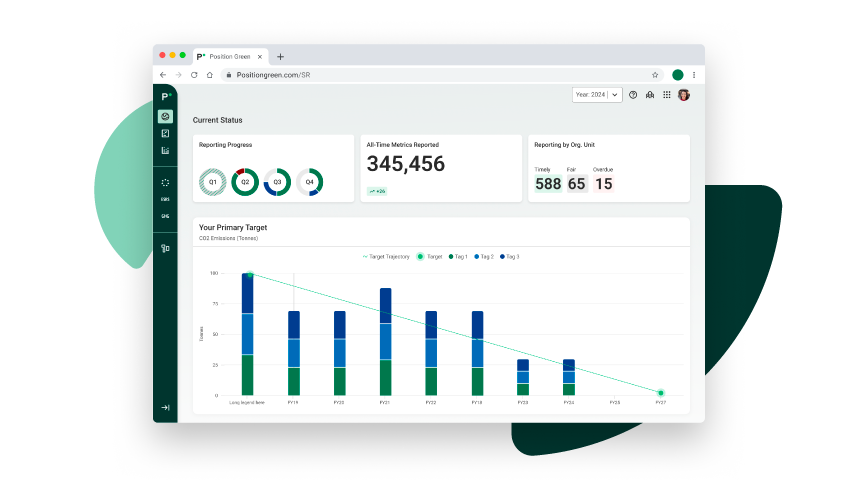High-impact ISSB reporting features
Customized for your industry
Based on your industry, we will identify and display the specific required standards needed to report in line with ISSB within our software.
ISSB reporting software
Identify, manage and report sustainability data in line with industry-specific ISSB Standards to enable comparable ESG performance and boost investment opportunity.

Streamline the ISSB reporting of your industry-specific sustainability data as a foundation for sustainable business growth. Position Green’s full-cycle ISSB Solution helps you focus on the most critical areas of measurement, simplify the process of starting or continuing sustainability efforts and integrate ISSB Standards into your ESG strategy.
Receive support from our sustainability consultants with both the data collection process and in writing a SASB aligned report, including guidance in using and implementing the Marine Transportation Standard template.
Train your workforce in sustainability best practices and regulatory frameworks with our ESG e-learning package and specialist courses.
See how you can take the admin out of impact with Position Green’s software.
Get a tour of the software and see how it works
Talk to an ESG software expert
No strings attached
The Sustainability Accounting Standards Board (SASB) was founded in 2011 as an independent organisation that develops and publishes industry-specific sustainability accounting standards. The SASB Standards provide guidance for companies to disclose financial material sustainability information to investors in a standardised, decision-useful format.
The SASB Standards cover a wide range of sustainability topics, including climate change, human rights, labour practices and product safety. They are designed to be industry-specific, taking into account the unique sustainability risks and opportunities of different industries. Companies worldwide use SASB Standards for their annual reports, financial filings, company websites, sustainability reports and more.
A 2021 merger between SASB and the International Integrated Reporting Council formed the Value Reporting Foundation (VRF). In 2022, the IFRS Foundation subsequently integrated the VRF and Climate Disclosure Standards Board with its own newly formed International Sustainability Standards Board (ISSB), which took over responsibility for the SASB Standards. The ISSB has committed to maintaining and developing the SASB Standards and leveraging the industry-based approach to standards development.
The SASB Standard provides an industry-specific framework for companies in the marine transportation industry to disclose financial material sustainability information to investors in a standardised format. By using the SASB standard, companies can provide more comprehensive and comparable information on their sustainability performance, which can help investors make more informed investment decisions.
The SASB Marine Transportation Standard is specifically tailored to the sustainability risks and opportunities that are unique to the marine transportation industry. It covers a wide range of topics, including greenhouse gas emissions, air pollution, water quality, safety and labour practices. By providing guidance on what information to disclose and how to disclose it, the SASB Standard can help companies better manage their sustainability risks and opportunities, and improve their overall sustainability performance.